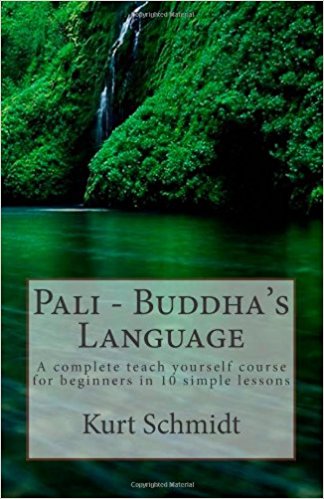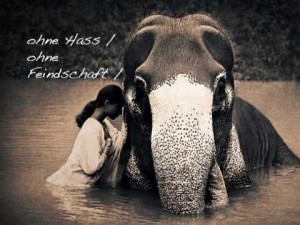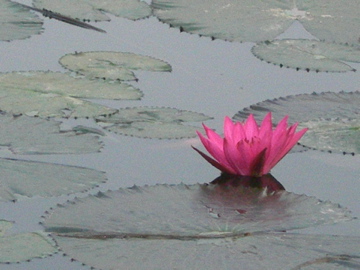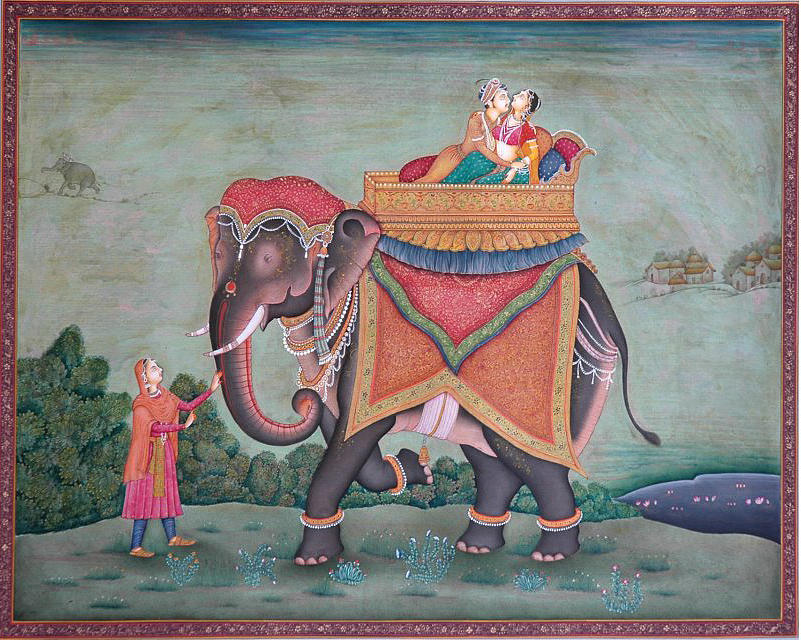Happily Ever After, and Even After That!
At Sunday Sangha last week we got into a discussion about the fact that of course we “cling” to our loved ones (spouses, children, grandchildren, etc.). And Brian mentioned that at a recent retreat, Bhikkhu Bodhi pointed out that while many of the Buddha’s teachings were given to monastics, many of them were not — they were given to “regular people,” who were married and had children, etc. — and that it’s important to know who the Buddha was talking to when we try to understand these teachings.
Which brought to mind the sutta where the Buddha tells Nakulapita and his wife Nakulamata how they could stay together and in love with each other as long as they lived….and on into future lives as well!
“This discourse also shows that far from demanding that his lay disciples spurn the desires of the world, the Buddha was ready to show those still under the sway of worldly desire how to obtain the objects of their desire. The one requirement he laid down was that the fulfillment of desire be regulated by ethical principles.” (from In the Buddha’s Words, by Bhikkhu Bodhi)
Here’s what it says in the sutta:
“One morning the Blessed One dressed, took his upper robe and bowl, and went to the dwelling of the householder Nakulapita. Having arrived there, he sat down on the seat prepared for him. Then the householder Nakulapita and the housewife Nakulamata approached the Blessed One and, after paying homage to him, sat down to one side. So seated, the householder Nakulapita said to the Blessed One:
“Venerable sir, ever since the young housewife Nakulamata was brought home to me when I too was still young, I am not aware of having wronged her even in my thoughts, still less in my deeds. Our wish is to be in one another’s sight so long as this life lasts and in the future life as well.
“Then Nakulamata the housewife addressed the Blessed One thus: Venerable sir, ever since I was taken to the home of my young husband Nakulapita, while being a young girl myself, I am not aware of having wronged him even in my thoughts, still less in my deeds. Our wish is to be in one another’s sight so long as this life lasts and in the future life as well.
“Then the Blessed One spoke this: If, householders, both wife and husband wish to be in one another’s sights so long as this life lasts and in the future life as well, they should have the same faith, the same moral discipline, the same generosity, the same wisdom; then they will be in one another’s sight so long as this life lasts and in the future life as well.” (AN 4:55)
***
How sweet is that!
So Now I’m Totally into Pali!
 I’m still feeling the effects of taking that course on Vedana, at the Barre Center for Buddhist Studies, where Akincano really opened my eyes to the benefits of comparing several different translations of the same sutta — including jumping in and looking at the original Pali!
I’m still feeling the effects of taking that course on Vedana, at the Barre Center for Buddhist Studies, where Akincano really opened my eyes to the benefits of comparing several different translations of the same sutta — including jumping in and looking at the original Pali!
I’ve even started working my way through a surprisingly readable — and enjoyable! — little book: Pali–Buddha’s Language: A Complete Teach Yourself Course for Beginners in 10 Simple Lessons, by Kurt Schmidt, which includes a website with audio recordings of the Pail lessons that students are encouraged to (STRONGLY encouraged to) memorize.
So I’m doing it!
Starting with this very famous verse from the Dhammapada (Dhp. 5), which Gil Fronsdal translates as:
Hatred never ends through hatred.
By non-hate alone does it end.
This is an ancient truth.
Which Kevin Trainor translates as:
For hatred does not cease by hatred at any time:
hatred ceases by love, this is an old rule.
And Ajahn Sujato translates as:
Hatred is never appeased by hatred in this world. By non-hatred alone is hatred appeased. This is a law eternal.
Here’s the original Pali, with word-for-word translation from the book by Kurt Schmidt:
Na hi verena verani
Not namely through-enmity enmities
sammat’ idha kudacanam
stop here ever
a-verena ca sammanti
through-non-enmity and they stop
esa dhammo sanantano.
this Law (is) eternal.
***
I think this is really cool. So OK. I confess. I’m a total sutta geek!
Not Easy
 I’m back now from Wisconsin, where I was helping my mother — and my father — adjust to my mother’s deteriorating state of dementia, and from Massachusetts, where I was studying the concept of “feeling tone” in Buddhist psychology — and really getting into the Pali texts!
I’m back now from Wisconsin, where I was helping my mother — and my father — adjust to my mother’s deteriorating state of dementia, and from Massachusetts, where I was studying the concept of “feeling tone” in Buddhist psychology — and really getting into the Pali texts!
I have quite a lot to say about both of these experiences, but for now, let me combine the two by quoting the Buddha (from the Numerical Discourses, AN 2.32):
“I tell you, monks, there are two people who are not easy to repay.
“Which two? Your mother and father. Even if you were to carry your mother on one shoulder and your father on the other shoulder for 100 years, and were to look after them by anointing, massaging, bathing, and rubbing their limbs, and they were to defecate and urinate right there [on your shoulders], you would not in that way pay or repay your parents.
“If you were to establish your mother and father in absolute sovereignty over this great earth, abounding in the seven treasures, you would not in that way pay or repay your parents.
“Why is that? Mother and father do much for their children. They care for them, they nourish them, they introduce them to this world.”
Non-Hate
“Hatred never ends through hatred.
By non-hate alone does it end.
This is an ancient truth.”
— Dhammapada, trans. Gil Fronsdal
It Takes Courage
“We’ve been training for a period like this for a long time,” Jack Kornfield says, in the talk he gave at Spirit Rock the week after the election.
It’s a terrific talk. And it’s not just Jack… Thanissara is there with a plea to join the Native American protests against the pipeline in North Dakota, and it ends by playing a little Leonard Cohen. (“Even though it all went wrong, I’ll stand before the Lord of Song, with nothing on my lips but Hallelujah!“)
As a reminder of our training, and as a way to move forward, Jack offers this from the teachings of the Buddha:
“Others will be cruel; we will not be cruel. Thus we will incline our hearts.
“Others will kill or harm living beings; we will not harm beings. Thus we will incline our hearts.
“Others will be greedy; we will not be greedy. Thus we will incline our hearts.
“Others will speak falsely, maliciously; we will speak truthfully and kindly. Thus we will incline our hearts.
“Others will be envious; we will not be envious. Thus we will incline our hearts.
“Others will be arrogant; we will not be arrogant. Thus we will incline our hearts.
“Others will be unmindful; we shall establish mindful presence. Thus we will incline our hearts.
“Others will lack wisdom; we shall cultivate wisdom. Thus we will incline our hearts.”
***
Jack talk ends the talk with this quote by Thomas Jefferson: “One person with courage is a majority.”
Click here to listen.
Let None Wish Others Harm
 The December homework for the CDL (Community Dharma Leader) program has just arrived. The focus this month is on what Sharon Salzberg calls our Four Best Homes…the four Brahma Viharas, also translated as the four Divine Abodes: Metta (Loving Kindness), Karuna (Compassion), Mudita (Joy in the Happiness of Others) and Upekkha (Equanimity).
The December homework for the CDL (Community Dharma Leader) program has just arrived. The focus this month is on what Sharon Salzberg calls our Four Best Homes…the four Brahma Viharas, also translated as the four Divine Abodes: Metta (Loving Kindness), Karuna (Compassion), Mudita (Joy in the Happiness of Others) and Upekkha (Equanimity).
One of our assignments is to do a formal practice for each of the Brahma Viharas for one week during our sitting practice. That is: each day for a full week, do Metta practice during one entire sitting period. Then move to Compassion, then Joy, then finally Equanimity. As a support for this, the teachers sent the text of the Metta Sutta in its original Pali (the first language used to record the Buddha’s teachings) along with an English translation that’s slightly different from the one I heard the first time I encountered these teachings. I like it a lot. So I offer it here, for your welfare and benefit:
This is what should be done
By one who is skilled in goodness
Having glimpsed the state of perfect peace,
Let them be able, honest and upright,
Gentle in speech, meek and not proud.
Contented and easy to support,
With few duties, and simple in living.
Tranquil their senses, masterful and modest,
without greed for supporters.
Also, let them not do the slightest thing
That the wise would later reprove.
Let them cultivate the thought:
May all be well and secure,
May all beings be happy.
Whatever living creatures there be,
Without exception, weak or strong,
Long, huge or middle-sized,
Or short, minute or bulky,
Whether visible or invisible,
And those living far or near,
The born and those seeking birth,
May all beings be happy.
Let none deceive another
Or despise any being in any state;
Let none wish others harm
In resentment or in hate.
Just as with her own life
A mother shields her child,
Her only child, from hurt
Let all-embracing thoughts
For all beings be yours.
Cultivate a limitless heart of goodwill
For all throughout the cosmos,
In all its height, depth and breath —
Love that is untroubled
And beyond hatred or enmity.
As you stand, walk, sit or lie,
So long as you are awake,
Pursue this awareness with your might:
It is deemed the Divine Abiding — here and
now.
Holding no more to wrong views,
A pure-hearted one, having clarity
Of vision, being freed from all sense desires,
Is not born again into this world.
In the Mud but Not Muddy
 “The Dharma of the Buddha does not require a person to go into homelessness or to resign from the world, unless he or she feels called upon to do so; but the Dharma of the Buddha requires every person to free themselves from the illusion of self, to cleanse one’s heart, to give up one’s thirst for power, and lead a life of righteousness.
“The Dharma of the Buddha does not require a person to go into homelessness or to resign from the world, unless he or she feels called upon to do so; but the Dharma of the Buddha requires every person to free themselves from the illusion of self, to cleanse one’s heart, to give up one’s thirst for power, and lead a life of righteousness.
“And whatever people do, whether they remain in the world as artisans, merchants, or officers of the king, or retire from the world and devote themselves to a life of religious meditation, let them put their whole heart into their task; let them be diligent and energetic.
“And if, like the lotus flower, which grows out of muddy water but remains untouched by the mud, they engage in life without cherishing envy or hatred, and if they live in the world not a life of self but a life of truth, then surely joy, peace, and bliss will dwell in their minds.”
— adapted from the Buddhacarita, translated by Samuel Beal
Maybe Just One More
 One more photo from Italy. This one I would have missed if not for a fellow traveler, who stopped and pointed, and so I looked up.
One more photo from Italy. This one I would have missed if not for a fellow traveler, who stopped and pointed, and so I looked up.
What other delights, I wonder, have I missed?
The Awakened
How joyful to look upon the awakened
And to keep company with the wise.
Follow then the shining ones,
The wise, the awakened, the loving,
For they know how to work and forbear.
But if you cannot find
Friend or master to go with you,
Travel on alone–
Like a king who has given away his kingdom,
Like an elephant in the forest.
If the traveler can find
A virtuous and wise companion
Let her go with them joyfully
And overcome the dangers of the way.
Follow them
As the moon follows the path of the stars.
— from the Dhammapada, translated by Thomas Byron (pronoun edits by me)
Out Loud, Four Times
 Part of the CDL homework for this month is to read the Satipatthana Sutta (text on the Foundations of Mindfulness) — OUT LOUD, FOUR TIMES — including all the repetitive parts, which are usually only written out fully the first time they occur, then indicated by ellipses on the MANY occasions when they occur after that. The sutta in book form (with ellipses) is only about 10 pages long, but it is QUITE repetitive, so the actual out-loud reading takes about 20 minutes or more. (When it’s chanted in Pali, it can take about an hour.) The language of the text is somewhat archaic and the style is highly formulaic, so while the study of the practices outlined in the text can be fascinating (and profoundly transformative) the actual READING of the text can be….well…boring.
Part of the CDL homework for this month is to read the Satipatthana Sutta (text on the Foundations of Mindfulness) — OUT LOUD, FOUR TIMES — including all the repetitive parts, which are usually only written out fully the first time they occur, then indicated by ellipses on the MANY occasions when they occur after that. The sutta in book form (with ellipses) is only about 10 pages long, but it is QUITE repetitive, so the actual out-loud reading takes about 20 minutes or more. (When it’s chanted in Pali, it can take about an hour.) The language of the text is somewhat archaic and the style is highly formulaic, so while the study of the practices outlined in the text can be fascinating (and profoundly transformative) the actual READING of the text can be….well…boring.
Here’s a sample: In this way, in regard to the body he abides contemplating the body internally, or he abides contemplating the body externally, or he abides contemplating the body both internally and externally. He abides contemplating the nature of arising in the body, or he abides contemplating the nature of passing away in the body, or he abides contemplating the nature of both arising and passing away in the body.
(See what I mean?)
But anyway, I did it. All four time.
And I loved it!
The first reading was kind of a slog. And the second wasn’t much better. But then I got into a groove on the third reading, and by the fourth, there was an aliveness to it that I definitely had not expected. Partly it was the rhythm of the repetition. Partly it was the chant-like quality of the phrasing. But mostly, I think, it was something else that I can’t quite put my finger on. Something to do with simultaneously saying and hearing the words….the combination of the physical sensation of reading the syllables aloud and the mental experience of understanding the words but not quite “getting” them (because of the archaic usage and phrasing)…that triggered a way of saying and hearing the words that was closer to feeling them than to either speaking or listening.
Very interesting.
May All Beings Be At Ease
 Whatever living beings there may be;
Whatever living beings there may be;
Whether they are weak or strong, omitting none,
The great or the mighty, medium, short or small,
The seen and the unseen,
Those living near or far away,
Those born and to-be-born —
May all beings be at ease.
— from the Metta Sutta, the Buddha’s words on Loving Kindness
***
In case you can’t tell, this is a photo of the cats I adopted upon returning from my retreat in South Africa. That’s Stella on the right. She is giving Izzy a kiss on the head. (click on the image to enlarge)



